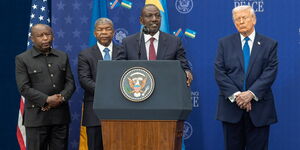Kenya is set to enjoy zero tariff treatment if a proposed partnership between China and 53 African countries is agreed.
In a letter to ministers of the Forum on China–Africa Cooperation (FOCAC), Chinese President Xi Jinping said that it would be available once the leaders of the continent negotiate and sign the agreement of China-Africa Economic Partnership for Shared Development.
President Jinping identified two main areas of opportunity: first, to deepen the implementation of the ten partnership actions for modernisation, and second, to strengthen cooperation in key projects."
He stated that cooperation in the green industry, e-commerce and e-payment, science and technology, and artificial intelligence, along with enhanced security, finance, and rule of law initiatives, would promote the high-quality development of China-Africa cooperation.
Citing the current global challenges, such as the tariffs imposed by United States President Donald Trump, he emphasised that China was committed to providing new opportunities for the world.
If signed, the agreement would bring significant economic benefits to Kenya. The most immediate and obvious advantage is that Kenyan products would enter the vast Chinese market without being subjected to import duties.
This would effectively lower the cost of Kenyan goods for Chinese consumers and businesses, making them more competitive. As a result, export volumes, particularly for agricultural products, manufactured goods, and other commodities, could rise significantly.
Additionally, a zero-tariff policy would provide room for export diversification, enabling the country to trade in more value-added goods.
Beyond this, such a policy could spur economic growth and job creation, as increased exports would generate higher revenues for businesses, potentially stimulating production, investment, and employment across various sectors.
Moreover, the promise of easier access to the Chinese market could make Kenya a more attractive destination for Chinese foreign direct investment, especially in export-oriented industries.
However, despite the potential benefits, key concerns remain. These include increased competition and product quality issues, the risk of a skewed trade balance, and persistent non-tariff barriers, all of which could hinder the full realisation of the policy’s advantages.
Also, Kenya’s diplomatic relations with the US, which imposes tariffs on the nation, will be under heightened scrutiny as China is America’s greatest global competitor.
The latest comes after President William Ruto's China tour in April, where he struck seven deals worth Ksh100.1 billion ($773M) in areas such as tourism, manufacturing, and agriculture.












